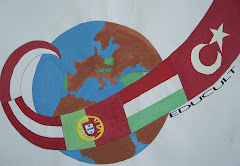







In the classroom we studied one of the festivities of our calendar: Carnival.
At this point, there are mini - holidays and many people like to have fun masquerading, and playing both on the streets or at school.But beyond the party we did in the classroom, we were also to discover the origins and the different ways to celebrate Carnival, both in Portugal in the World.
Now look what we found!
February is the month of Carnival. In the present year, this celebration it was on 16th (Tuesday)and, as always, kids and grown ones will do the usual. There will be street parades with allegoric cars, people wearing masks, especially children, and many innocent tricks. That’s the Portuguese Carnival.In school we hava a mini-hollidays (3 days- Monday, Tuesday and Wednesday ).
Carnival is a celebration with Christian origins. The tradition comes from the year 1091, when Catholic Church definitively established Lent’s date. The word “carnival” has an uncertain origin. Nowadays, the most accepted explanation reports that this word means “goodbye to meat”, from the Latin words “carnem” (meat) and “levare” (take). This explanation has implicit the idea of fasting. The day after Carnival (named Ash Wednesday) marks the beginning of Lent, which is a period of abstinence that ends on Easter day. In this period, many practices weren’t allowed and food, in particular, was strongly restricted.
Caretos
There are many original and amusing ways of celebrating the Carnival in Portugal; One of the most ancient may be seen in some villages of Trás-os-Montes (a north-east region in Portugal), especially in Podence and Ousilhão. Here, the
Caretos are kings. They run, scream and jump frighteningly trough the village like little devils freed from control, causing surprise to the unwary.
Carnival in Portugal is celebrated throughout the country, the most famous are the ones of
Ovar,
Madeira,
Loulé,
Nazaré, and
Torres Vedras.
Length and individual holidays
While the starting day of Carnival varies, the festival usually builds up to a crescendo in the week before lent, ending on Mardi Gras (Fat Tuesday), before
Ash Wednesday, the beginning of
Lent.
Paradoxically, Portugal having introduced Christianity and the customs related to Catholic practice to Brazil, has started to adopt some of the aspects of Brazilian-style Carnival celebrations, in particular those of Rio de Janeiro with sumptuous parades, Samba and other

Brazilian musical elements.
Class D - 2th year
With the help of book



































